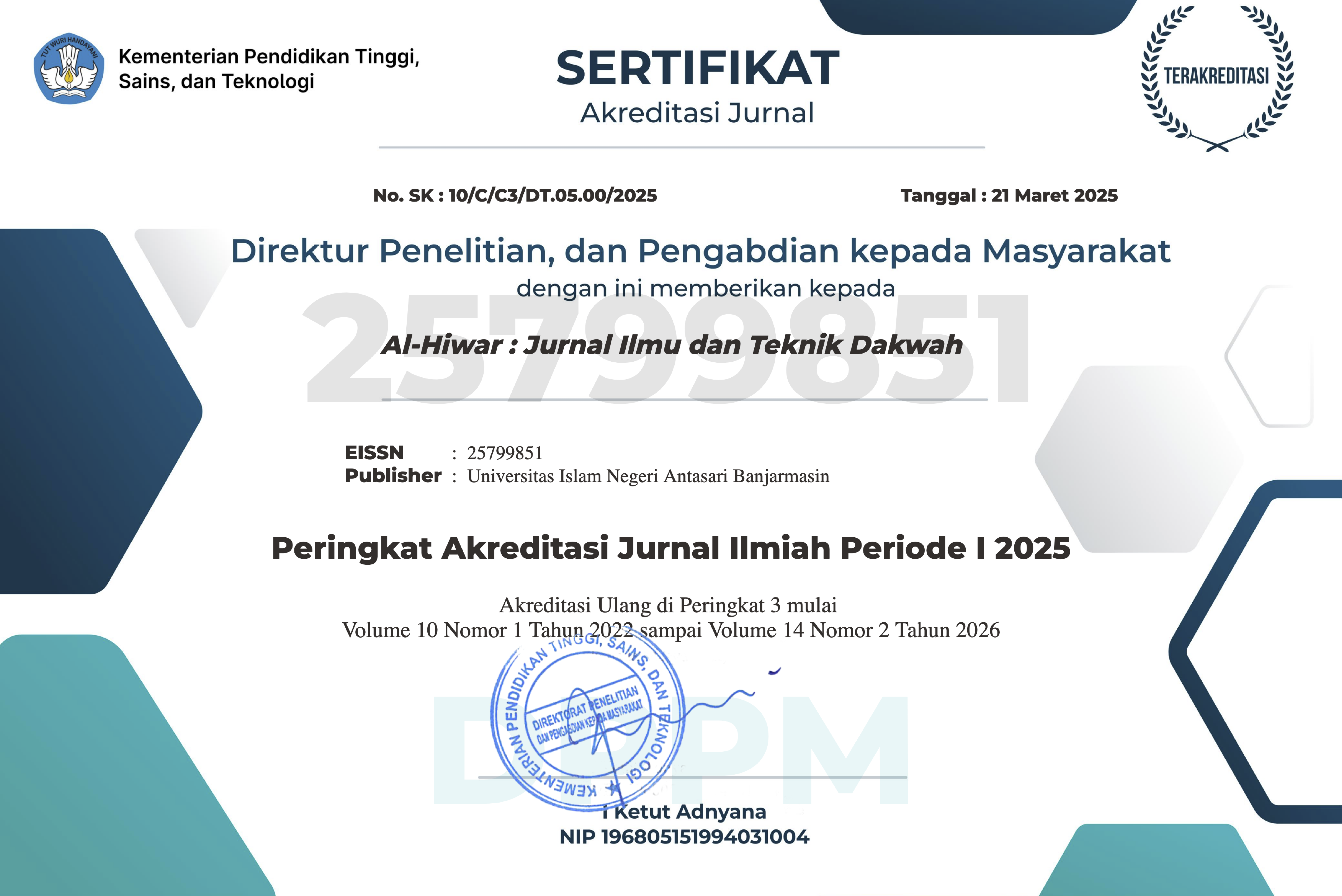The Relationship between Self Boundaries and People Pleaser Behavior in Islamic Guidance and Counseling Students at UIN Raden Mas Said Surakarta / Hubungan Self Boundaries Terhadap Perilaku People Pleaser Pada Mahasiswa Bimbingan dan Konseling Islam di UIN Raden Mas Said Surakarta
DOI:
https://doi.org/10.18592/alhiwar.v12i2.14355Keywords:
students, people pleaser, self boundariesAbstract
Self boundaries are important for students to apply in everyday life in order to have clear boundaries. The impact of individuals who do not have clear and firm self-boundaries causes people pleaser behavior. Self boundaries play a role in helping efforts to deal with mental and emotional well-being. This study aims to determine the relationship between self boundaries and people pleaser behavior in Islamic Guidance and Counseling students at UIN Raden Mas Said Surakarta. The research method used in this study is quantitative with a correlational approach. The sample technique uses systematic random sampling, the sample of this study is Islamic Guidance and Counseling students at UIN Raden Mas Said Surakarta which is obtained by 112 students. The results of the data analysis of this study using Pearson product moment correlation hypothesis test produced a value with a significance value of 0.000. These results indicate that there is a significant relationship between self boundaries and people pleaser behavior in Islamic Guidance and Counseling students at UIN Raden Mas Said Surakarta with a significant and positive direction.References
Alfahmi, R. R., Fateha, S. R., Syarifatulmillah, W. P., Lestari, F., & Hamidah, S. (2024). Kajian Mendalam Mengenai People Pleaser dan Dampak Psikologis pada Pelakukunya. Finweek.
Anggita, U. (2022). What’s The Matter With People Pleaser. BUKU BIJAK.
Arsyad, A. Z., & Muchlis, I. (2024). Membangun self boundaries dalam peningkatan pendidikan karakter di era bullying sekolah. 2(2), 30–46.
Clancy, A. (2018). Manage & Lead How to stop being a people-pleaser. ResearchGate Publication, August.
Cole, T. (2021). Boundary Boss (1st ed.). PT Gramedia Pustaka.
Devanti, Amara. (2021). Jadi Orang Nggak Enakan, Memang Enak? Caesar Media Pustaka.
Devina, N. A., & Murdiana, S. (2024). The Relationship Between Self-Acceptance and People Pleaser in Late Adolescents Who Experienced Parental Divorce. International Journal of Society Reviews (INJOSER), 2(4), 1002–1010.
Dewi, S. (2016). Konsep Perlindungan Hukum Atas Privasi Dan Data Pribadi Dikaitkan Dengan Penggunaan Cloud Computting Di Indonesia. Yustisia, 5(1), 26.
Fitri, E., Zola, N., & Ifdil, I. (2018). Profil Kepercayaan Diri Remaja serta Faktor-Faktor yang Mempengaruhi. JPPI (Jurnal Penelitian Pendidikan Indonesia), 4 nomor 1, 1–5.
Hayati, S. A., & Haryadi, R. (2024). Korelasi Antara People Pleasing dengan Attachment Pada Siswa SMA Negeri 12 Banjarmasin. Jurnal Bimbingan Konseling Islam & Kemasyarakatan.
Hadfield, S., & Hasson, G. (2022). Cara Bersikap Tegas Dalam Segala Situasi. Bhuana Ilmu Populer.
Hall, R. D. (2020). Between Friends, an “Implicit Trust”: Exploring The (Non)Disclosure of Private Mental Health-Related Information in Friendship. Ohio Communication Journal, 58, 26–39..
Karimah, D. Z. (2023). Efektivitas Bimbingan Kelompok Islam Dengan Pendekatan Rational Emotive Behavior Therapy Untuk Mengatasi Sikap People Pleaser Pada Mahasiswa IAIN Kudus. IAIN Kudus.
Manson, M. (2018). Sebuah Seni Untuk Bersikap Bodo Amat (1st ed.). PT Gramedia Widiasarana Indonesia.
Muhibbin, M., & Marfuatun, M. (2020). Urgensi Teori Hierarki Kebutuhan Maslow dalam Meminimalisir Prokrastinasi Akademik Di Kalangan Mahasiswa. Educatio, 15(2), 69–80. https://doi.org/10.29408/edc.v15i2.2714
Marjo, H. K., & Sodiq, D. (2022). Etika dan Kompetensi Konselor Sebagai Profesional (Suatu Pendekatan Literatur Sistematis). Jurnal Paedagogy, 9(1), 86. https://doi.org/10.33394/jp.v9i1.4512
Priadana, S., & Sunarsi, D. (2021). Metode Penelitian Kuantitatif (1st ed.). Pascal Books.
Rahma Hidayati, F., & Irwansyah, I. (2021). Privasi “Pertemanan” Remaja di Media Sosial. Jurnal Teknologi Dan Sistem Informasi Bisnis, 3(1), 78–91. https://doi.org/10.47233/jteksis.v3i1.186
Stefani, V. (2020). Perancangan Web Desain Untuk Mengurangi People Pleaser Di Kalangan Mahasiswa Di Kota Semarang.
Sari, D. P., & Komarudin. (2024). Hubungan Antara Strategi Coping dan Resiliensi pada Mahasiswa dengan Kecenderungan People Pleaser. 5(9).
Wee, D. (2021). Tegas Membangun Batas (Agni, Ed.). Laksana.
Wulandari, I. G. A., & Widiasavitri, P. N. (2021). Self-Care Mahasiswa Sarjana Psikologi dengan Ketertarikan Psikologi Klinis. Psycho Idea, 19(2), 137. https://doi.org/10.30595/psychoidea.v19i2.7215
Downloads
Published
How to Cite
Issue
Section
License
Copyright (c) 2024 Farras Raisa Zalika, Athia Tamyizatun Nisa

This work is licensed under a Creative Commons Attribution 4.0 International License.
Authors who publish with this journal agree to the following terms:
- Authors retain copyright and grant the journal right of first publication with the work simultaneously licensed under a Creative Commons Attribution License that allows others to share the work with an acknowledgement of the work's authorship and initial publication in this journal.
- Authors are able to enter into separate, additional contractual arrangements for the non-exclusive distribution of the journal's published version of the work (e.g., post it to an institutional repository or publish it in a book), with an acknowledgement of its initial publication in this journal.
- Authors are permitted and encouraged to post their work online (e.g., in institutional repositories or on their website) prior to and during the submission process, as it can lead to productive exchanges, as well as earlier and greater citation of published work.






